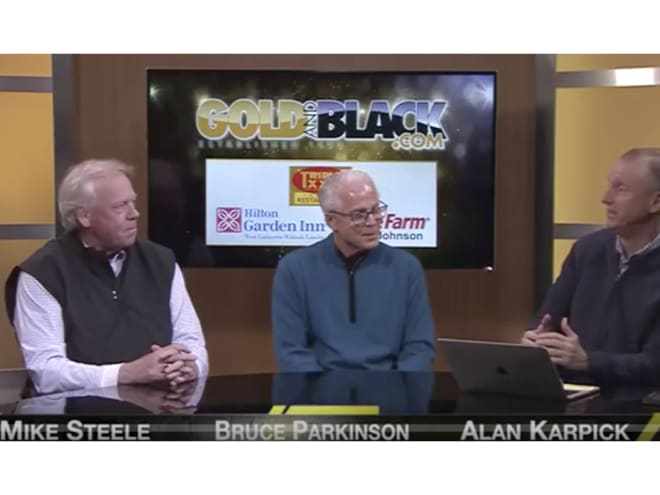

The following is an excerpt from a recent interview with Class of 2020 Boilermaker Hall of Fame inductee Bruce Parkinson and his teammate Mike Steele. Parkinson and Steele came to Purdue in 1973 and were both guards under coach Fred Schaus.
Parkinson, a native of Yorktown, Ind. is Purdue's all time leader in assists (690, an average of 6.2 per game, having 16 10-assist games during his years as a Boilermaker (1973-77). That is double the next highest (Brian Walker 7). Steele played in 65 games, 10 as a starter, is from Robinson, Ill. and played an especially important role in the Boilermakers' 1974 NIT run in Madison Square Garden.
Parkinson is now retired from Cummins after a career as an HR professional. He lives in Noblesville, Ind. Steele is still running his insurance agency and resides in Greenville, N.C.
GoldandBlack.com: Bruce, put into context what it means to be inducted into the Purdue Athletics Hall of Fame?
Bruce Parkinson: It’s a really big deal. Unlike the Indiana Basketball Hall of Fame (of which Parkinson is a member), this is a higher level competition at the college level. It’s across all sports too, it’s not just Purdue Basketball. It’s the Purdue Athletic Hall of Fame, the men and women who have competed at Purdue.
When Mike Bobinski called last fall, I was in Cracker Barrel waiting to go eat with my mom. I wondered if I should call him back. I thought he was reaching out for fundraising. My mom got to hear that call (which was special).
GoldandBlack.com: Mike Steele has coached DePauw, East Carolina, and Butler. He has a great career in basketball too. One of the stories you’ve told me is playing against Bruce one and one and how hard he was to beat. Is that true?
Steele: Oh yeah, I beat him most of the time (tic). As a sub, you have to make sure you keep the starters’ confidence up. No, he beat me so many times.
We’d play one on one at Mackey, Lambert, the co-rec, the Beta house, at Sears. We played so much and we played so many pick up games. We loved playing. I know it made me better playing against him because he was so good. My senior year, our second team we had Kyle Macy and Jerry Sichting, and myself. We had good battles until Parkinson got hurt (against Rutgers early in the season). Great players, great guys. We had a great group.
GoldandBlack.com: One of the guys you were close to was Bob King, who has passed away. What do you think Coach would be thinking today?
Parkinson: Well I wish he was here. His son Mike King is coming and sitting at our table. He’ll be representing coach Bob. Bob’s the reason I’m here.
I still remember as a high school sophomore, Coach Bob snuck into this gym at Delta High School. He had his cardigan sweater on, khaki pants, and a white polo on underneath it. This is Yorktown now, so for a Purdue guy, everyone knows Coach Bob in Indiana basketball.
I think he was the only Purdue guy that Coach Knight was friends with. Bob would come to games and he would write handwritten notes. I found one the other day. Those things meant more than anything. Mike and I have had some great times with Coach Bob. He was like a second dad. I’ll tell his son later tonight, thanks for sharing your dad with us.
Steele: When I send emails out I always put an MS. People ask why I do that and it’s because it’s my way of thinking of Coach Bob. I didn’t go to Purdue because of him, but I did graduate because of him. This was before computers and everything. You would go to that locker and there would be a note hanging on it saying “See me before practice.” He knew when everybody missed a class. Once you went up there, it was like (dealing with) the IRS. He already knew so you had to tell him the truth.
GoldandBlack.com: 1974 was a magical year for Purdue Basketball. Purdue was ranked 11th in the country (in the final AP poll) after winning the NIT Championship. How do you put that into perspective today?
Steele: I can remember it like it was yesterday. It’s funny the things you remember. I remember going into Madison Square Garden and there’s Bill Bradley and all of those guys (on the Knicks) playing H-O-R-S-E. Back then, if you were in the NIT, you went to New York and you stayed until it was over (or you were eliminated). Parkinson and I roomed together for what felt like a long time.
We played North Carolina the first game, they were ranked eighth in the country and had a couple guys that were on the Olympic team. We were ready to go to Myrtle Beach to play golf as soon as we lost that first game. So much for Myrtle Beach.
Parkinson: We both packed for the weekend. We had to go buy some new clothes and get our clothes cleaned because we ended up being there for 11 days.
Steele: The thing that Coach (Fred) Schaus and Bruce didn’t get enough credit for is that all those years we never finished below fifth in the Big Ten. Now if you finish fourth or fifth in the Big Ten, you’re not only going somewhere but you’re going to probably win your first game (in the NCAA Tournament) because you’re going to be a pretty high seed.
In 1974, NC State won the national championship. We had them down about 10 at home (before losing to them late.) We were about as good as anybody that year.
GoldandBlack.com: Bruce. talk about some guys that helped with you become Purdue’s all-time assists leader.
Parkinson: I was thinking about this the other day. It’s almost like two eras. The first era was with Joe (Jovan Price) and Frank (Kendrick and big John Garrett. John stayed with us for three years, Frank graduated and then it was Wayne (Walls), Walter (Jordan) and Eugene (Parker) the next years.
All those Indiana guys were unbelievable and they were all seniors. It wasn’t like we were one and done. Everybody had veterans. Michigan’s Campy (Russell) left one year early and (Minnesota’s) Mark (Olberding) left early, and that’s it in those days.
The other thing that was different between now and then is that when Mike and I were freshman, we played 24 games. I played 112 games in my career, two of those were the redshirt year I broke my wrist (1975-76). Vince Edwards played 138 games. He played more games than we had our freshman season. 26 more games than we played. When you think about that and the three point shot, the Big Ten Tournament, and the NCAA tournament, it was a different era.
Steele: Our freshman year was the first year that freshman could play on varsity. There were only two (in the Big Ten) that started every game (Parkinson and Indiana’s Quinn Buckner). Most of the time, nobody went in thinking they were going to start or play. As soon as we got there, Park was the best from day one.
GoldandBlack.com: Tell us how everything went down when you started on the varsity.
Parkinson: I had forgotten that they referred to it as varsity and JV. Robbie (McCarter), Mike and I were down in the big open locker room. We were freshman and track guys were down there, football guys were down there. It’s not like the facilities now. Everyone was in there except the basketball team. A week before the season, they put the manager that always growled at us because we wore those sweatbands. My stuff wasn’t in the locker room when we got there. I went to the equipment manager and told him that my stuff wasn’t in there and he told me it was in the Varsity locker room. We had no clue. My heart was beating. Coach never even told me that was going to happen.
GoldandBlack.com: How much has the game of basketball changed since both of you have played in terms of prep?
Parkinson: You have to be bigger and you have to be stronger. Now, if Mike and I were growing up in elementary, we might have a personal coach if we could afford it. I was fortunate to play for Coach Schaus who really believed in me and gave me a chance right at the beginning. I probably averaged 35 minutes a game. Hardly anyone should be playing that much anymore because they have to play so hard to each time out. It’s so much more physical. It’s very demanding. That just doesn’t happen so much anymore. You don’t see how I tried to play in terms of setting people up for points… John, Walter, or Frank… I don’t see that in today’s point guards. It’s more of a flow versus a play that we used to run our back door or throw it over a guy’s ear. Now they want to use the shot clock.
Steele: With AAU ball, the point guard gets it and then he shoots it if at all possible. If he doesn’t, it’s because he couldn’t get the shot off. When they lose a game, then they go to this (another) gym to play. (So there is no huge penalty for losing)
Back then, we didn’t have to go out and guard guys in the three point line. That takes so much out of guys. We just went behind the screen and now you have guys trying to fight through those screens. You can take your time and hang on to it. There’s still guys that can pass it but there are very few players who can pass first.
Parkinson: If I were giving advice to current Purdue guards, I would tell them to watch TJ McConnell from the Pacers. Look at the difference from Doug McDermott last year, and McDermott this year. When he comes off a pick, McConnell already knows he’s coming around a pick. He’s going to throw the ball before he’s actually open. His numbers are way up because of that guy. He’s the only one I watch even in the NBA who’s thinking about his teammate ahead of time.
Steele: Another one that does that is Ben Simmons on the 76ers. He gets 12-15 assists. As good as LeBron is, he still gets guys involved. He gets so many triple doubles. When I’m coaching, I tell guys all the time “When you’re as excited as you pass the ball when you pass to the guy that scores as when you score, then you’re going to have a pretty good team.”

Membership Info: Sign up for GoldandBlack.com now | Why join? | Questions?
Follow GoldandBlack.com: Twitter | Facebook | YouTube
More: Gold and Black Illustrated/Gold and Black Express | Subscribe to our podcast
Copyright, Boilers, Inc. 2020. All Rights Reserved. Reproducing or using editorial or graphical content, in whole or in part, without permission, is strictly prohibited.
